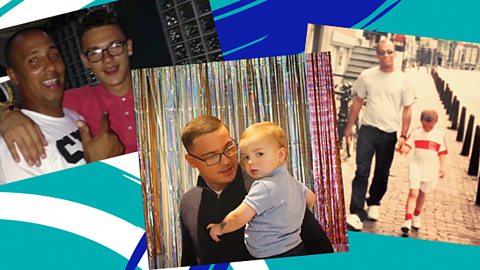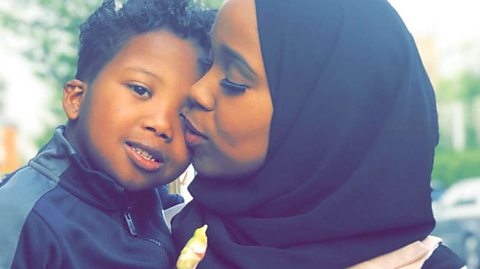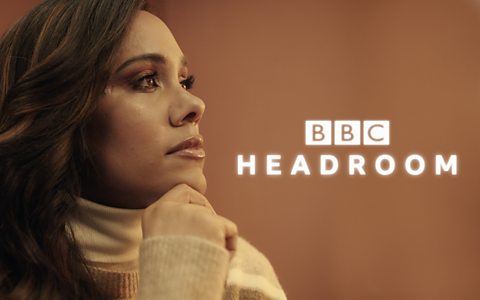Angus, 32, has a 3 year-old son, Alfie. In his early 20s, Angus was diagnosed with muscular dystrophy. We spoke to Angus about his life as a dad.
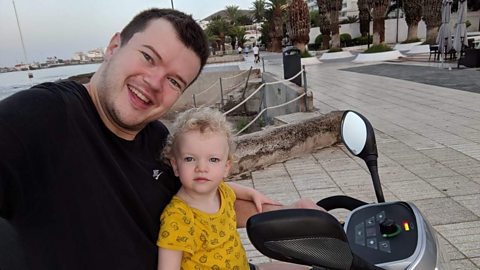
The diagnosis
I was into sport while I was growing up and put a lot of time and effort into rugby. At one point I even thought about the possibility of pursuing a professional rugby career. In my late teens, however, my mobility started to decline and I found that I was struggling to run. I even started to notice it on a day-to-day basis. Then, at the age of 22, I was diagnosed with a condition called muscular dystrophy.
It was a very difficult thing to deal with at the time. I went from playing rugby at a decent level to being told that I would eventually need a wheelchair. The doctors told me that over time I would lose strength in my muscles and that it wasn’t something that could be reversed.
Going travelling
My wife Lucy and I had to face up to what it meant for us as a couple if we wanted to be parents very early on in our relationship. I loved the idea of having children but always imagined it happening later on in life.
We decided to quit our jobs and go travelling for a year, which helped us come to terms with our future. In many ways the trip we went on gave us the strength and confidence we needed to face up to reality.
Before that I didn’t really talk to any of my friends about my condition. They sort of knew and they could see something wasn’t right, but they didn’t want to ask about it. It was the elephant in the room. I didn’t really speak to my family either; they thought that I didn’t want to talk about it. They were right - I very much tried to brush it under the carpet. When I came back to the UK after our trip, it was with a renewed sense of acceptance and understanding. My condition forced Lucy and I to grow up a lot faster than we expected to.
I realised that the earlier I had children, the more able I was going to be. I wanted to be as strong for my children as possible.
We got engaged, and a couple of years later, our son Alfie was born.
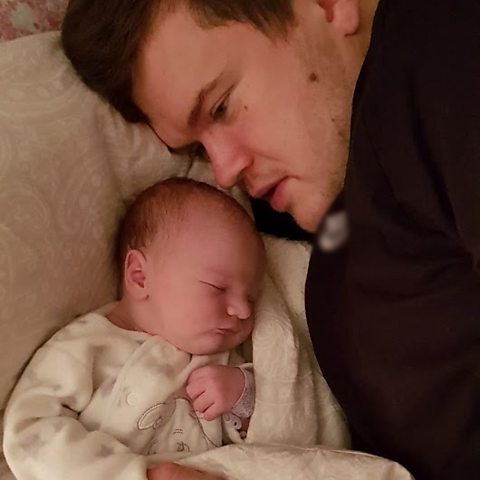
Becoming a dad
The first two years were hard. I couldn’t be left alone with Alfie and I didn’t feel confident with him for the first year or so, which was something which upset me. As an incredibly active person, nothing ever used to hold me back and that’s how I imagined myself as a parent. Even though I had this obvious joy at having a son, it was tough only really being able to hold Alfie when sitting on the sofa with him.
What I had to learn very early on was that my way of being a dad would have to be unconventional - I couldn’t be carrying Alfie around or picking him up all the time.
But that didn’t mean for a minute that our relationship would be less strong. In fact, I’ve found that having a different way of doing things has given Alfie a greater awareness and brings us closer together. We work as a team. From a very early age Alfie would help out, just little things like picking things up from the floor when I couldn’t bend down. It’s really helped us form a much stronger bond than we might have otherwise.
First solo trip
I think it was just before his second birthday that Alfie and I had our first solo trip out of the house. That was incredibly nerve-racking because I was worried what would happen if something went wrong. In the end it was amazing: Alfie was as good as gold and he behaved so well. Alfie is very empathetic and loving. He’s only three and a half years old, but as soon as he knows he needs to help me he’ll drop whatever he’s doing.
He enjoys rough and tumble play on the sofa or the bed, and I think it’s great that we can do something physical together and have a cuddle. On a day-to-day basis he likes cooking with me, doing puzzles, playing with his toys. He’s also into watching films as it’s a way we’ve been able to bond together since an early age. He loves Moana and he keeps on calling me Maui after the big strong guy played by Dwayne Johnson. It’s nice that he sees me as that guy!

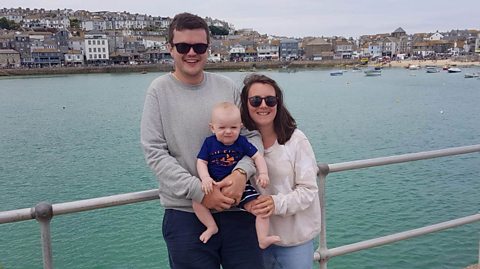
Help from friends
My friends were incredible when I became a dad. I knew that if I was sitting down I needed somewhere to put Alfie so that I could stand up easily. I wanted to get one of those hospital trolleys that you can raise and lower to make it easier to have somewhere safe to put him. I remember asking my friends for advice and they all had a whip round and bought this piece of medical-grade equipment. That really made a huge difference and it was such a thoughtful, kind gesture.
Misconceptions about disability
There is still a massive misconception that disabilities are bad and require charity and pity. I think some people assume daily life as a disabled person is inherently worse: they think you can’t have sex, you can’t be a parent, you can’t do lots of things. That isn’t just incorrect, it’s ridiculous. Of course, disabilities often mean you have to do things differently. But I am as good a dad as anybody else.
In a way, I’m grateful that I do have muscular dystrophy, as without my condition I wouldn’t have decided to have kids so early on. Alfie makes it all worthwhile.
Of course, there are things I need help with, but in many ways the experience of becoming disabled has enriched my life. My friends sometimes joke that I have a better life now, because of my disability, due to my family and the business I’ve set up since my diagnosis. Having a disability can definitely give you a renewed perspective on life: you don’t really see the point in caring about the little things.
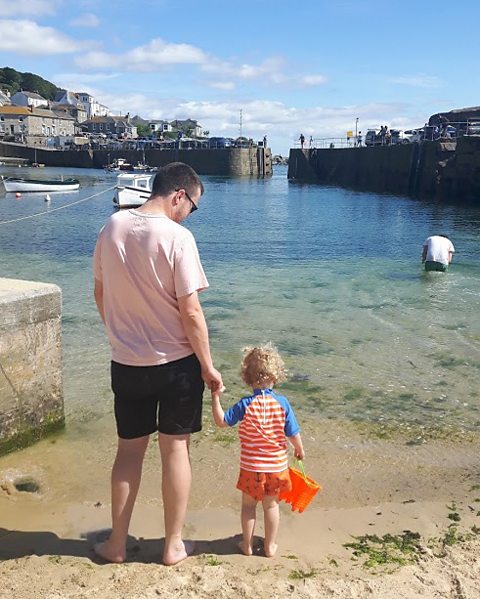
Angus's tips
The power of teamwork
My wife Lucy and I have to work together as a team to make everything easier. We split the roles around the house based on what I can do, and what I can’t do. I work really hard to ensure that I do everything I am able, such as the cooking and the driving, and Lucy does all the jobs I can’t manage physically, such as washing and cleaning. We are so effective as a team when we’re working together and Alfie really benefits from that.
Health and fitness
A lot of people with disabilities unfortunately don’t have access to fitness facilities or a healthy diet. I undertake strength and conditioning training and do everything I can to eat healthily. It’s had a huge impact on my physical and mental health and helps me be in better shape for parenting. The fact that I am as strong, fit and healthy as I can be gives me more energy, and the ability to be the best dad I can for Alfie. That is really important.
Make time/balance schedule
I run my own travel business to help other disabled people go on holiday. It’s hard work, but the flexibility of being my own boss is very beneficial. I have been working at home during the pandemic, which has meant that I get to spend more time with Alfie and I try to plan my schedule so that we have as much time together as possible.
Planning
Getting ready and going out of the house in the morning can take me a while, and it takes even longer now that we have Alfie. In order to ensure we make the most of our days out it’s so important for us to plan and prepare, including getting everything ready the night before. We also have to consider where we go, as if we arrive somewhere not suitable for either a child or a person with a disability it makes it very challenging. We research different locations that are accessible and suitable for children and we’ve found some wonderful places to visit and enjoy as a family.

For more information about muscular dystrophy, visit Muscular Dystrophy UK.

